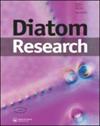一种简单的硅藻晶体扫描电镜横向解理方法及其应用
IF 1.3
3区 生物学
Q2 MARINE & FRESHWATER BIOLOGY
引用次数: 1
摘要
利用扫描电镜(SEM)对硅藻瓣的表面结构进行了初步研究,透射电镜(TEM)对硅藻瓣的截面形状和内部细胞结构进行了分析。然而,超薄切片既不能显示出整个结构被切割的部分,也不能反映出被切割部分与周围结构的关系。因此,我们开发了一种简单的方法来获得一个干净的解理面。在该方法中,将一滴硅藻悬浮液冷冻在预先浸泡在液氮中的定制金属接头束上,然后进行SEM样品制备。整个断裂体的三维(3D)结构和截面特征,如阀和带的厚度、投影角度、乳晕、缝系和孤立孔隙的内部结构,在每半个断裂体中都是可见的。在细胞分裂后不久应用这种方法揭示了亲代和新形成的阀在相应部位的二氧化硅沉积剖面的差异。讨论了从劈裂结构中获得的信息的实用性。本文章由计算机程序翻译,如有差异,请以英文原文为准。
A simple method for making transverse cleavages of diatom frustules for scanning electron microscopy and its application
The surface structures of diatom valves have been primarily studied using scanning electron microscopy (SEM), while the frustule shape and internal cellular structures have been elucidated in cross-sections by transmission electron microscopy (TEM). However, ultrathin sections can show neither the part of the whole frustule that is cut nor reflect the relationship between the sectioned portion and the surrounding structure. Therefore, we developed a simple method for obtaining a clean cleavage surface of the frustule. In this method, a drop of diatom suspension was frozen on a custom-made bundle of metal joints pre-soaked in liquid nitrogen, followed by sample preparation for SEM. The three-dimensional (3D) structure of the entire frustule and cross-sectional features, such as the thickness of the valve and bands, the angle of projection, and the internal structures of the areolae, raphe systems, and isolated pores, were visible within each half of the cleaved frustule. Applying this method shortly after cell division revealed differences in the silica deposition profiles between parental and newly forming valves at the corresponding sites. The utility of the information obtained from the cleaved frustule is discussed.
求助全文
通过发布文献求助,成功后即可免费获取论文全文。
去求助
来源期刊

Diatom Research
生物-海洋与淡水生物学
CiteScore
2.70
自引率
16.70%
发文量
27
审稿时长
>12 weeks
期刊介绍:
Diatom Research is the journal of the International Society for Diatom Research. The journal is published quarterly, in March, June, September and December, and welcomes manuscripts on any aspect of diatom biology.
In addition to full-length papers, short notes and reviews of recent literature are published which need not contain all the sections required for full-length papers; we see these as being necessary to record information which is of interest but which cannot be followed up in detail. Discursive “Opinion” papers are encouraged which would not necessarily follow the normal lay-out. If extremely long papers are to be offered, the author(s) should contact the editors first to discuss any problems. Book reviews, obituaries and meeting reports can be published. All papers will be subject to critical review by the editors and referees, as appropriate to their content. Papers will be accepted in English only.
 求助内容:
求助内容: 应助结果提醒方式:
应助结果提醒方式:


